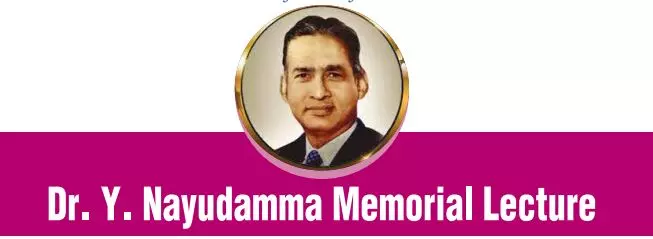Dr Y Nayudamma memorial lecture

Hyderabad:At the Dr Y. Nayudamma Memorial Lecture, group vice chancellor of BITS, Pilani, Prof V. Ramgopal Rao said India’s research must focus on real-world impact, guided by the needs of society and industry rather than being confined to academic repositories.
The lecture was organised by the Telangana Academy of Sciences at the CSIR-IICT’s Vivekananda Auditorium to honour Dr Y Nayudamma, a chemist who transformed India’s leather industry. Born in Guntur, Nayudamma rose to become the director of the Central Leather Research Institute (CLRI) in Chennai, where his groundbreaking work not only advanced the industry but also improved the lives of countless tanners. The lecture also brought together scientists, industry experts, and academics, with A.V. Rama Rao, chairman of AVRA Laboratories, as the chief guest along with Prof. Rao.
In his lecture, Prof. Rao presented the reality of India’s research and development (R&D). “We’re third in the world in research output but 40th in innovation,” he said, referencing data from the slides in his presentation. “That’s where we’re lacking. We’re publishing papers, but we’re not translating that knowledge into something useful.”
He said that India spends less on R&D than other BRICS countries, allocating only 0.7 per cent of its GDP, most of which goes to the Defence Research and Development Organisation (DRDO). The slides displayed India’s spending on R&D in comparison to other nations, showing India lagging behind countries like Brazil, which allocates 1.3 per cent of its GDP to R&D. On the other hand, countries like South Korea and Israel spend over 4.5 per cent.
Rao said research projects in Indian higher education institutions should address problems relevant to society, industry, or strategic needs, rather than simply existing for academic records. “Our research projects should come from society, industry or strategic agencies—not libraries,” he stated.
He pointed out that India ranks 66th in industry-academia collaboration, describing this as a lost opportunity to connect academic research with practical applications. “Why are we so poor in working with industry? We need our research to connect with the real world,” he questioned.
Although India has one of the fastest-growing startup ecosystems, ranked third globally in the number of start-ups, Rao noted that most of these companies are business model innovations rather than genuine technological advancements.
“All these unicorns are business model innovations, not technology innovations,” he said, stressing the need for technology-driven solutions that address local challenges. Rao also drew attention to Amul as a successful example of a business model designed for grassroots impact, explaining that the Amul model worked because it was tailored to the needs of farmers and communities.
“Availability of innovation is not the main problem, but adaptability is, especially in agriculture and grassroots issues,” he remarked, suggesting that technology must be made more accessible by business model innovation which is lacking in India. “Our management schools, for example, are trained based on the Harvard Business School model, so they’re not equipped to handle issues specific to India,” he observed.
According to the slides, he suggested that a ‘Morrill moment’ could be beneficial for Indian academia, similar to how the US Land-Grant universities were established to serve the needs of the country’s agricultural and mechanical industries.

